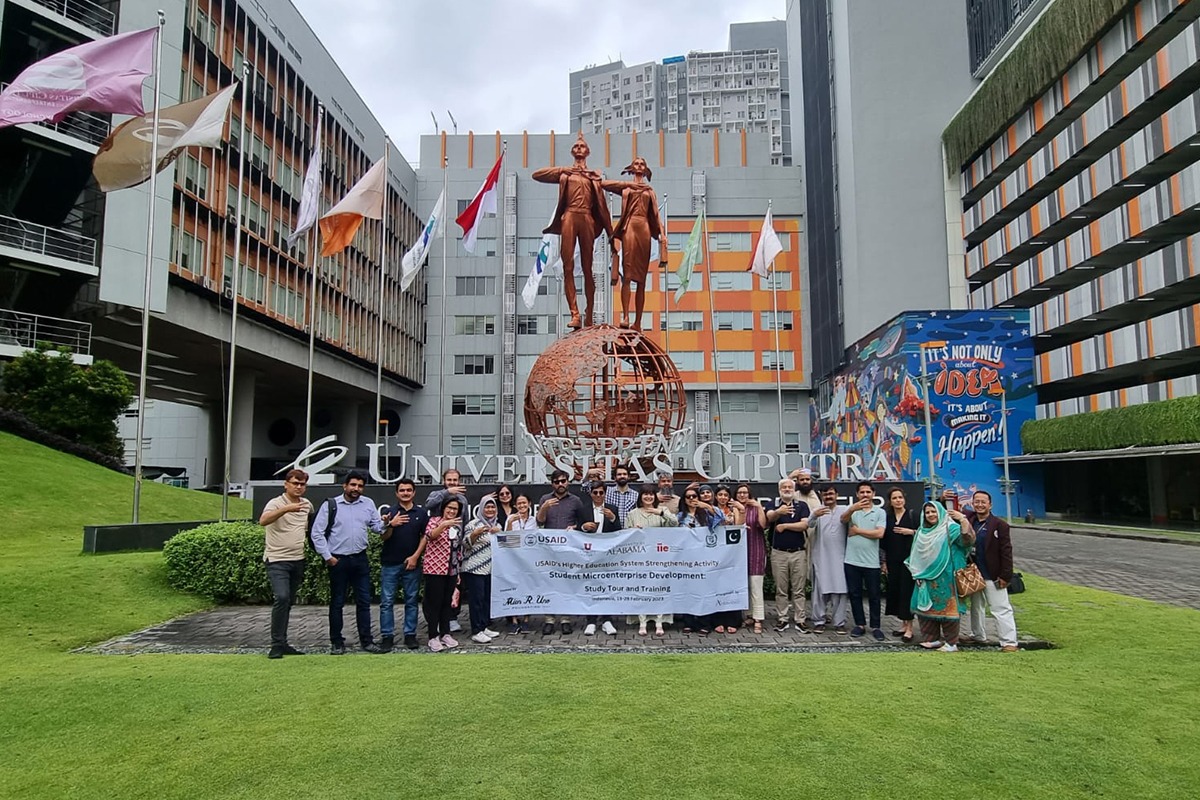From February 19-28, 2023, USAID’s Higher Education System Strengthening Activity (HESSA) led a delegation of 17 Pakistanis (including five women) representing each of HESSA’s 16 partner universities, as well as a representative from the Higher Education Commission of Pakistan to Indonesia for the Student Microenterprise Development Study Tour.
Indonesia was selected as the location for this study tour due to the success of the USAID/Indonesia JAPRI youth entrepreneurship program that IIE implemented between 2017-2022. The tour aimed to introduce diverse student microenterprise development models implemented by Higher Education Institutions, partner NGOs, and government institutions in Indonesia. Participants also discussed with Indonesian university leadership how to create enabling environments for student microenterprise development and foster knowledge-sharing between Pakistani HEIs and their HEI counterparts in Indonesia.
In Jakarta (Feb. 19-21), the delegation met and had extensive dialogues with the following groups to learn more about how they inculcate entrepreneurial ecosystems: Local non-profits (Mien R. Uno Foundation – MRUF) dedicated to promoting student entrepreneurship with partners, local business owners and coaches who provide business mentoring and coaching support to students, impact start-up funds, USAID/Indonesia, and the Ministry of Education of Indonesia.
In Bandung (Feb. 22-24), participants were hosted by Universitas Pendidikan Indonesia (UPI) and underwent a condensed JAPRI Training of Trainers session with UPI lecturers. They met with current student entrepreneurs, graduates that are successful business owners, and the university Rector and leadership. They also visited the business incubator and other facilities designed to promote entrepreneurship among a broad swath of students within the university ecosystem. Then, in Surabaya and nearby Madura (Feb. 25-28), the delegation visited rural villages that had been trained and supported by universities with student and community engagement programs. They also had the opportunity to meet with student MSME owners and university leadership, both in a high-resource area (Surabaya) and a low-resource area (Madura).
In this tour, participants gained a far more holistic understanding of entrepreneurship and student microenterprise development, seeing it as a viable solution for both poverty alleviation and employment for graduates. Within the current context of Pakistani higher education, there is an overemphasis on research and commercialization without considering the impact that microenterprise development can have for a much broader swath of students and communities across Pakistan. To help address this gap, entrepreneurship curriculum can be introduced to students at the beginning of their programs, regardless of their discipline.
Participants were drawn by the USAID JAPRI model and reported that they wish to see such programming supported by USAID/Pakistan. The consortium model with local NGOs, university partners, and local governments is highly impactful and adaptable. The inclusion of gender sensitivity training for the men supporting women entrepreneurs, targeted activities for persons with disabilities, and the mentoring and coaching model for students was much appreciated by the participants.
“The training offered great learning experiences and interactions with Indonesian HEI counterparts who provided insights and connections. The main takeaway is that we [Pakistani HEIs] were more focused on innovation, technology and other related areas for student startups/businesses, and we are not working on enterprise development. Therefore, there is a need to shift towards microenterprise development. This approach is market-based and highly supportive for students to relate to local markets. I’ll take successful students’ case studies and use them at KIU, as micro enterprises is a new area for us and we would like to practice it for the benefits of students and faculty,” said Mehfooz Ullah of Karakoram International University.
Participants reported that they now understand the much broader entrepreneurial ecosystem that needs to be engaged to successfully promote student microenterprise development, particularly in engaging local community partners like NGOs as well as other universities. They remarked it was an excellent networking, relationship-building, and partnership opportunity, both internally with the USAID’s HESSA partner HEIs and HEC, as well as with Indonesian universities and JAPRI partners. As a next step, the participants are developing action plans to prioritize one key area that they plan to focus on to further microenterprise development at their HEIs.

